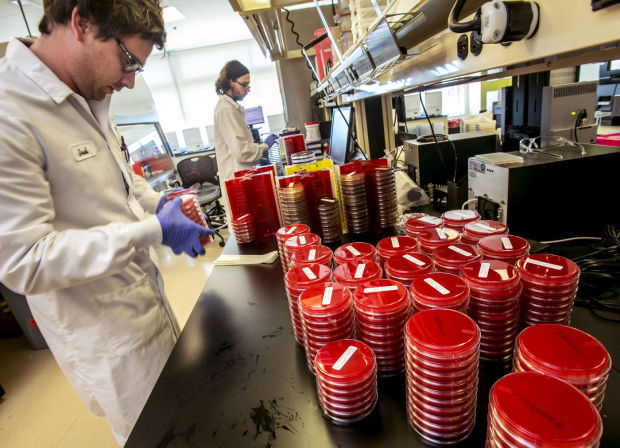Arizona continues adding jobs in the high-wage bioscience sector, which includes businesses such as Tucson’s Accelerate Diagnostics. The sector might slow, though, due to lagging research and grant revenue.
Arizona’s bioscience industry has continued its long-standing trend of high-wage job growth, but declining grant and research revenue may challenge future growth, a new report shows.
According to the latest Arizona Bioscience Roadmap update, Arizona added 36,700 bioscience jobs between 2002 and 2014, a 49 percent increase to 110,410, including hospitals.
That outpaced national growth in bioscience jobs of 14 percent during the same period, according to a report released Tuesday by TEConomy Partners, formerly Battelle Technology Partnership Practice.
Also on the plus side, capital invested in Arizona bioscience companies reached its highest figure in four years, and all measures of bioscience tech transfer at Arizona universities are on the rise, with increases in startups, invention disclosures, patents and licenses, the TEConomy report said.
“There is evidence of innovation throughout Arizona and many positive economic signs, as the number of high-paying bioscience jobs continues to increase at an impressive rate,” Mitch Horowitz, principal and managing director of TEConomy Partners, said in a news release.
But declining research dollars and expenditures raise concerns about the industry’s long-term capacity to keep adding jobs.
National Institutes of Health grants and bioscience-related academic research-and-development expenditures both dropped in the latest year of data and are failing to keep pace with the nation, TEconomy found.
“If creative steps are not taken to reverse these trends, the state’s bioscience industry will be hard-pressed to keep growing,” Horowitz said.
The Phoenix-based Flinn Foundation commissioned the latest performance analysis as part of its coordination of Arizona’s Bioscience Roadmap, a long-term strategy to guide the state through 2025. The report will formally be presented at an event in Tucson on Wednesday.
Other findings of the Bioscience Roadmap update:
- Arizona added 36,700 bioscience jobs between 2002 and 2014, a 49 percent increase that brings today’s total to 110,410, including hospitals. Bioscience jobs have grown nationally at a 14 percent rate during this time.
- The average salary of an Arizona bioscience worker is $61,823, compared to $46,514 for the state’s private sector.
- In 2015, Arizona’s bioscience industry attracted $82 million in venture-capital investments, the highest level since 2011 and the third straight year of growth. The state’s 0.56 percent share of bioscience venture capital investments nationwide is the highest rate since 2011, but it’s still well below goals set in the roadmap.
- NIH funding was $151 million in 2015, down from $158 million in 2014. Since the start of the Roadmap in 2002, Arizona’s NIH annual funding has grown 12 percent compared to 40 percent for the top 10-funded states. Arizona generally had met or exceeded that top 10 growth rate during previous years.
- Bioscience research and development spending dropped slightly to $451 million in 2014, and Arizona’s growth rate of 55 percent since 2002 falls short of the national growth rate of 78 percent.
- University bio-related startups increased 24 percent in 2014-15 compared with the previous two years. During the same period, there was a 72 percent increase in patents and a 54 percent increase in invention disclosures.
Setting aside hospitals, the largest bioscience subsector, Arizona has 24,040 bioscience jobs in 1,284 companies or institutions, with an annual wage of $76,360, TEConomy found.
Ron Shoopman, chairman of Arizona’s Bioscience Roadmap Steering Committee, said he’s encouraged by the continued growth of the bioscience industry and its rising venture investment.
“But leaders must emerge in the state to make the necessary strategic research investments,” said Shoopman, president of the Southern Arizona Leadership Council. “If not, we risk falling behind in not only developing new treatments, but in the commercialization of this research, which is crucial for job growth and building a critical mass of companies.”





